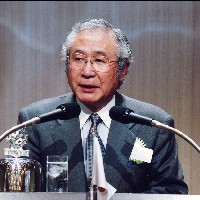��Changing Society, Changing School Education��
March 10th, 2004
Mr. Tetsuo Tamura
Head of the Shibuya Kyoiku Gakuen School
 The meeting of March 10 welcomed Mr. Tetsuo Tamura, head of the Shibuya Kyoiku Gakuen School to speak on the topic ��Changing Society, Changing School Education��: It is said that as society changes, education does too, but it is hard to say which changes first. However, it is true that they are closely related, so I wish to explain how our society has, or is changing.
The meeting of March 10 welcomed Mr. Tetsuo Tamura, head of the Shibuya Kyoiku Gakuen School to speak on the topic ��Changing Society, Changing School Education��: It is said that as society changes, education does too, but it is hard to say which changes first. However, it is true that they are closely related, so I wish to explain how our society has, or is changing.
In the past we had our middle schools and high schools, then colleges and post graduate courses, and one would have to graduate the preceding course in order to enter a higher institution. From now, this idea will be done away with, and each educational facility will be independent of others. We are supported to submit our recommendations as to how to cope with this issue by this summer.
The basic reason for this change is the great increase in international exchange. In foreign countries, students graduate when they are 16 or 17 years of age and when they return to Japan they cannot be admitted to our colleges.
Japan became a wealthy country in the 1970�� and 80��s, and those who were the recipients of education started to think that a change was necessary for our society.
There were no laws or legal base for education in pre-war Japan, but only directives. The compulsory education which we received were at ��People��s School�� which were so named in 1941, and the many different schools we had were unified. Schools which offered varying curriculum were abolished and a system where everyone studied the same topics was installed.
There was an international survey of children��s school grade in OECD countries, and there were opinions that there was no need for anxiety as the Japanese students�� scores were high, while on the other hand voices were raised that there was need for concern.
One example quoted by those voicing concern was an example – ��A river runs through a valley, soil is created and a plain is developed where farming is done – what are the merit?�� 70 or 80% of Japanese children answered correctly, while the world average was 50%. But for the second question ��with the same conditions, what are the demerits?�� The correct answers for the Japanese children was 20% while the world average was 50%. In other words Japanese children could answer correctly when the outcome was clear, but could not when the outcome was unknown. It is starting to be said that herein lies the weakness of our education.
However, according to an education survey by OECD, our educational level is good, with France and Germany being very poor. The two countries have been taken aback at this report, and are considering new national efforts.
The Scandinavian countries scored highly, with Finland doing the best.
There is a common factor among high rating counties, and that is the teachers have received vocational training. Children who are educated by teachers who have a vocational and social background seem to do better. In countries such as Germany or France, the class aims to achieve a certain common target, while in Scandinavia, where the teachers look after each student individually they seem to do better.
Japan has much more freedom in education than Germany or France. In a rebound from the authoritarian Nazi policy of unification, post war Germany de-centrified its authority between the 13 states. This was a great mistake, as it resulted in 13 authoritarian systems, so the answer is not in decentralization.
I believe the trend now is to look at the individual, and not at the group to discern where the needs of education really are.
How can we improve our higher education system? Today, the envy of the world regarding this aspect is the United States. President Madison, the 4th American President decided not to open national universities, and to have those where everyone can enter.
After many changes, the result was a variably stratified system from the world famous universities such as Yale, Harvard, Princeton, etc., to the so-called community colleges where anyone can enter. The superiority of American colleges is maintained by the fact that by graduating from a lower level college, one can enter a superior one. Thus an ideal college system, that one was able to enter easily, but more difficult to graduate was constructed.
We in Japan have decided to abolish national universities, and to replace them with independent administrative bodies, and we have started to build higher educational institutions befitting a democratic nation.
This reform will cause a competition among our advanced educational institutions and make them competitive on a world basis. The strength of an educational system derives from the strength of its advanced education. We wish to have our universities and post graduate schools to stand independently from high schools and be open to everyone. At the same time we must heighten their standards, thus adapting themselves to the changing Japanese society.
.